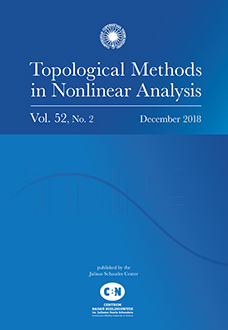Abstract
We discuss the role of the diffusion coefficient $a(x)$ on the existence of a positive solution for the quasilinear elliptic problem involving critical exponent $$ \begin{cases} - {\rm div}( a(x) |\nabla u|^{p-2} \nabla u) = u^{p^* - 1} + \lambda u^{p-1} & \text{in } \Omega, \\ u = 0 & \text{on } \partial\Omega, \end{cases} $$ where $\Omega$ is a smooth bounded domain in $\mathbb R^n$, $n \geq 2$, $1 < p < n$, $p^* = np/(n-p)$ is the critical exponent from the viewpoint of Sobolev embedding, $\lambda$ is a real parameter and $a\colon \overline{\Omega} \rightarrow \mathbb R$ is a positive continuous function. We prove that if the function $a(x)$ has an interior global minimum point $x_0$ of order $\sigma$, then the range of values $\lambda$ for which the problem above has a positive solution relies strongly on $\sigma$. We discover in particular that the picture changes drastically from $\sigma > p$ to $\sigma \leq p$. Some sharp answers are also provided.
Citation
Renato José de Moura. Marcos Montenegro. "The effect of diffusion on critical quasilinear elliptic problems." Topol. Methods Nonlinear Anal. 43 (2) 517 - 534, 2014.
Information





